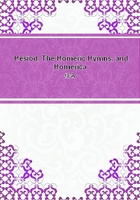
第46章 THE CATALOGUES OF WOMEN AND EOIAE (fragments) (8)
(ll. 11-20) But Electyron married the all-beauteous daughter of Pelops and, going up into one bed with her, the son of Perses begat.... ....and Phylonomus and Celaeneus and Amphimachus and.... ....and Eurybius and famous.... All these the Taphians, famous shipmen, slew in fight for oxen with shambling hoofs,....
....in ships across the sea's wide back. So Alcmena alone was left to delight her parents.... ....and the daughter of Electryon....
((LACUNA))
(l. 21) ....who was subject in love to the dark-clouded son of Cronos and bare (famous Heracles).'
Fragment #100 --
Argument to the Shield of Heracles, i:
The beginning of the "Shield" as far as the 56th verse is current in the fourth "Catalogue".
Fragment #101 (UNCERTAIN POSITION) --
Oxyrhynchus Papyri 1359 fr. 1 (early 3rd cent. A.D.):
((LACUNA -- Slight remains of 3 lines))
(ll. 4-17) `...if indeed he (Teuthras) delayed, and if he feared to obey the word of the immortals who then appeared plainly to them. But her (Auge) he received and brought up well, and cherished in the palace, honouring her even as his own daughters.
And Auge bare Telephus of the stock of Areas, king of the Mysians, being joined in love with the mighty Heracles when he was journeying in quest of the horses of proud Laomedon -- horses the fleetest of foot that the Asian land nourished, -- and destroyed in battle the tribe of the dauntless Amazons and drove them forth from all that land. But Telephus routed the spearmen of the bronze-clad Achaeans and made them embark upon their black ships. Yet when he had brought down many to the ground which nourishes men, his own might and deadliness were brought low....'
Fragment #102 (UNCERTAIN POSITION) --
Oxyrhynchus Papyri 1359 fr. 2 (early 3rd cent. A.D.):
((LACUNA -- Remains of 4 lines))
(ll. 5-16) `....Electra....
was subject to the dark-clouded Son of Cronos and bare Dardanus....
and Eetion....
who once greatly loved rich-haired Demeter. And cloud-gathering Zeus was wroth and smote him, Eetion, and laid him low with a flaming thunderbolt, because he sought to lay hands upon rich-haired Demeter. But Dardanus came to the coast of the mainland -- from him Erichthonius and thereafter Tros were sprung, and Ilus, and Assaracus, and godlike Ganymede, -- when he had left holy Samothrace in his many-benched ship.
((LACUNA))
Oxyrhynchus Papyri 1359 fr. 3 (early 3rd cent. A.D.):
(ll. 17-24) (68) ....Cleopatra ....the daughter of....
....But an eagle caught up Ganymede for Zeus because he vied with the immortals in beauty.... ....rich-tressed Diomede; and she bare Hyacinthus, the blameless one and strong.... ....whom, on a time Phoebus himself slew unwittingly with a ruthless disk....
ENDNOTES:
(1) A catalogue of heroines each of whom was introduced with the words E OIE, `Or like her'.
(2) An antiquarian writer of Byzantium, c. 490-570 A.D.
(3) Constantine VII. `Born in the Porphyry Chamber', 905-959A.D.
(4) "Berlin Papyri", 7497 (left-hand fragment) and "Oxyrhynchus Papyri", 421 (right-hand fragment). For the restoration see "Class. Quart." vii. 217-8.
(5) As the price to be given to her father for her: so in "Iliad" xviii. 593 maidens are called `earners of oxen'.
Possibly Glaucus, like Aias (fr. 68, ll. 55 ff.), raided the cattle of others.
(6) i.e. Glaucus should father the children of others. The curse of Aphrodite on the daughters of Tyndareus (fr. 67)may be compared.
(7) Porphyry, scholar, mathematician, philosopher and historian, lived 233-305 (?) A.D. He was a pupil of the neo-Platonist Plotinus.
(8) Author of a geographical lexicon, produced after 400 A.D., and abridged under Justinian.
(9) Archbishop of Thessalonica 1175-1192 (?) A.D., author of commentaries on Pindar and on the "Iliad" and "Odyssey".
(10) In the earliest times a loin-cloth was worn by athletes, but was discarded after the 14th Olympiad.
(11) Slight remains of five lines precede line 1 in the original:
after line 20 an unknown number of lines have been lost, and traces of a verse preceding line 21 are here omitted.
Between lines 29 and 30 are fragments of six verses which do not suggest any definite restoration. (NOTE: Line enumeration is that according to Evelyn-White; a slightly different line numbering system is adopted in the original publication of this fragment. -- DBK)(12) The end of Schoeneus' speech, the preparations and the beginning of the race are lost.
(13) Of the three which Aphrodite gave him to enable him to overcome Atalanta.
(14) The geographer; fl. c.24 B.C.
(15) Of Miletus, flourished about 520 B.C. His work, a mixture of history and geography, was used by Herodotus.
(16) The Hesiodic story of the daughters of Proetus can be reconstructed from these sources. They were sought in marriage by all the Greeks (Pauhellenes), but having offended Dionysus (or, according to Servius, Juno), were afflicted with a disease which destroyed their beauty (or were turned into cows). They were finally healed by Melampus.
(17) Fl. 56-88 A.D.: he is best known for his work on Vergil.
(18) This and the following fragment segment are meant to be read together. -- DBK.
(19) This fragment as well as fragments #40A, #101, and #102 were added by Mr. Evelyn-White in an appendix to the second edition (1919). They are here moved to the "Catalogues"proper for easier use by the reader. -- DBK.
(20) For the restoration of ll. 1-16 see "Ox. Pap." pt. xi. pp.
46-7: the supplements of ll. 17-31 are by the Translator (cp. "Class. Quart." x. (1916), pp. 65-67).
(21) The crocus was to attract Europa, as in the very similar story of Persephone: cp. "Homeric Hymns" ii. lines 8 ff.
(22) Apollodorus of Athens (fl. 144 B.C.) was a pupil of Aristarchus. He wrote a Handbook of Mythology, from which the extant work bearing his name is derived.
(23) Priest at Praeneste. He lived c. 170-230 A.D.
(24) Son of Apollonius Dyscolus, lived in Rome under Marcus Aurelius. His chief work was on accentuation.